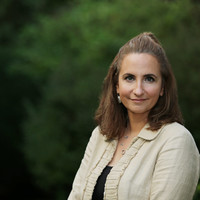I don't make monster sprays.
Maybe you've seen the pictures of them on Instagram or read about them in parenting blogs: Glittery, colorful placebos, good for chasing away the fearsome creatures in your child's room and mind.
They're harmless enough, I guess, but I've been working hard to provide an alternate storyline for my kids — not that I can magically chase away monsters but that there are none to worry about in the first place.
It's tempting, as a parent, to try to overcome kids' fears (and, frankly, sometimes just get them to go to sleep) by telling them your magic is stronger than monsters.
But lately, I've seen too much of that in our adult world, using boogeymen to control the weak.
Read, for example, an NBC News story about parents consumed with fear that schools use "social emotional learning" to indoctrinate their children with woke propaganda or to introduce ideas of suicide into their young brains.
In that worldview, teachers and school administrators are the evil creatures who want to damage and destroy vulnerable children. They must be literal monsters, after all, to undergo years of education and training in the service of compelling children to suicide and self-hatred.
There's no curriculum that should be immune to dissection and critique. But viewing with such profound distrust the motives of teachers leads to the demonization of an entire profession.
The fearmongering can be, and often is, worse.
Michael Berry, a conservative talk show host who has demanded Nuremberg trials for Democrats, urges his listeners to treat liberals like this:
"Show them no mercy. They showed you none. They are monsters."
But no political party is immune to the lure of the weaponization of fear.
Plenty of so-called progressives attended a recent anti-vaccine rally, for example, where Democrat Robert Kennedy Jr. compared vaccine mandates to the Holocaust.
Those who want everyone to be vaccinated, he said, are monsters — worse, even, than Nazis. At least Anne Frank, he said, got to hide in an attic.
Revolting, but it works.
Fear works. Dehumanization works.
The product — the worldview that monsters want to steal our lives and souls, and those of our children — flies off the shelves. Fear brings power and money.
I mean, we're better in most metrics than ever before. Kids use fewer drugs, have less sex and are more empathetic. We all live longer. Crime is far lower than it was 20 years ago, and charitable giving is up.
But the reality doesn't matter, not when compared to the sexy lure of the horror movie, the jolt of adrenaline we get from being afraid. The jump scare always wins.
Now, I realize that there's plenty to fear. As human as we are, some of us do evil; we are greedy corporate raiders, con artist radio hosts and far, far worse.
But monsters? No. Only those who live in humanity's darkness.
Claiming otherwise distances us, emotionally, from that darkness, but it does so falsely.
It's destructive to believe that we are different, special, better.
It destroys our communities and our relationships, but more critically, it makes us think we're more worthy of good things, that we have earned them with our awesomeness. Instead, we should recognize what an enormous role fortune, good and bad, plays in the paths of our lives.
So maybe we should all stop making monster sprays because there aren't any monsters here, only people.
It does not diminish someone else's crimes to soften our hearts, to remain vigilant against our tendency to exalt ourselves by lowering others.
Empathy is not an excuse. It is a victory.
For in the end, all we need to do to defeat the monsters is turn on the lights. Then, we can see that they were never there in the first place.
To learn more about Georgia Garvey, visit GeorgiaGarvey.com.
Photo credit: Anemone123 at Pixabay






View Comments